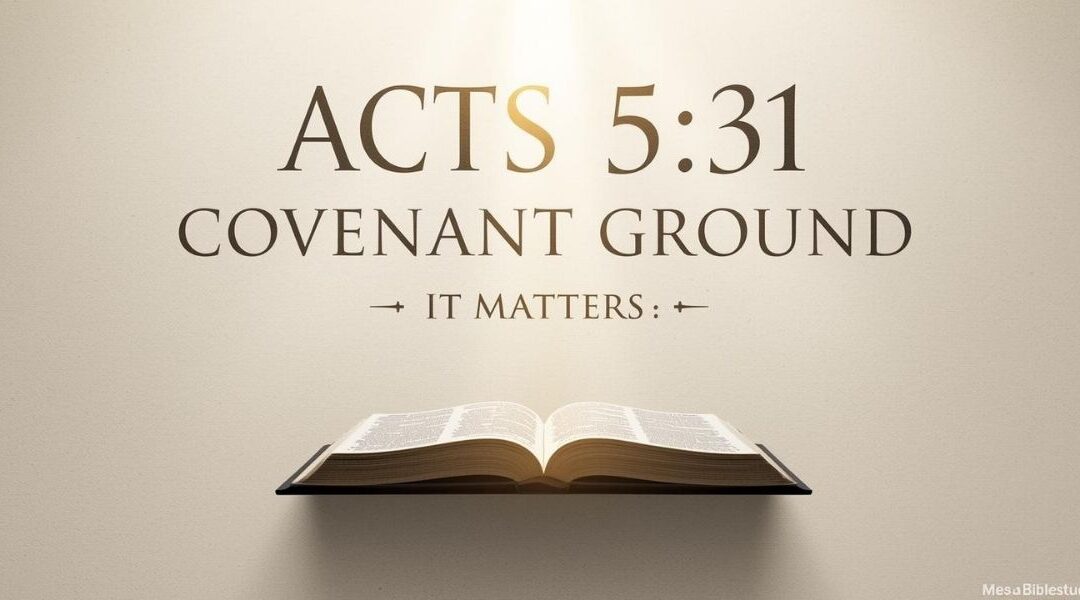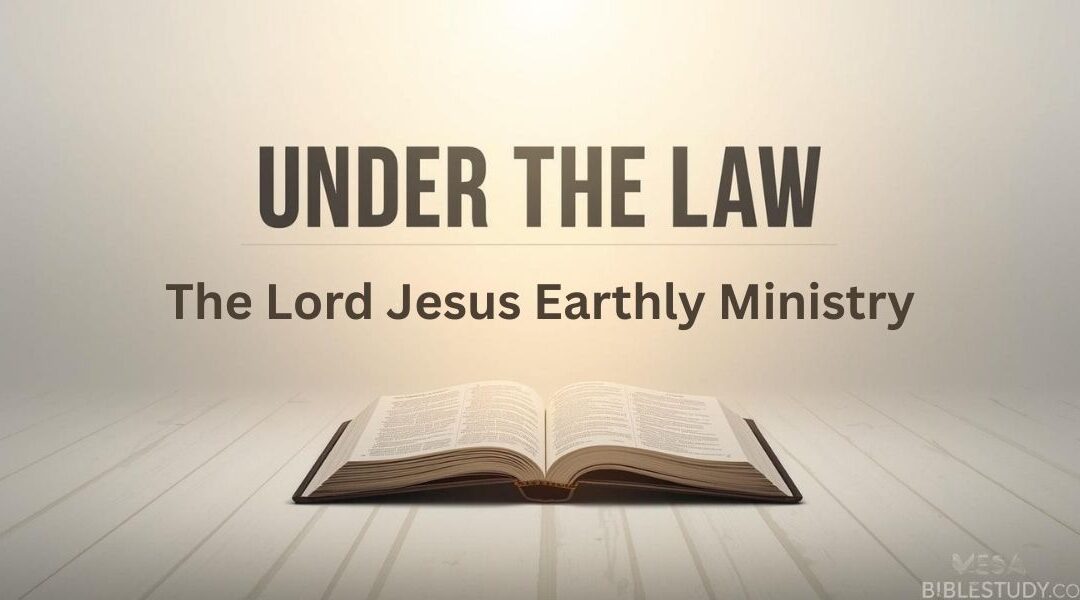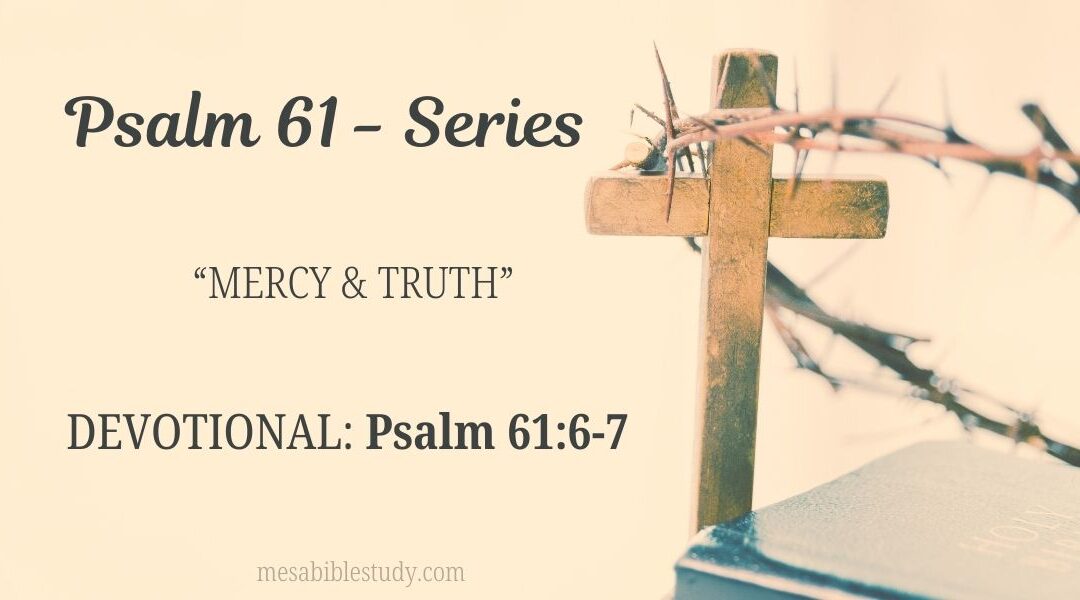
by Jamie Pantastico | Feb 9, 2026 | Verse-by-Verse Bible Studies |
Covenant Fulfillment, Not Church Doctrine
“Him God has exalted to His right hand to be Prince and Savior, to give repentance to Israel and forgiveness of sins.”
(Acts 5:31)
This verse is one of the clearest covenant declarations in all of early Acts. Every word, every phrase, and every person involved is grounded firmly in God’s promises to Israel, not the Church, not the Body of Christ, and not a new universal program of grace.
Understanding Acts 5:31 requires us to answer two foundational questions:
- Who is Peter speaking to?
- What promises is he referring to?
The answers are explicit in Scripture.
The Audience: Covenant Israel
Peter does not leave the audience open to interpretation.
He says plainly:
“…to give repentance to Israel and forgiveness of sins.”
Not to Gentiles.
Not to the Church.
Not to the Body of Christ.
To Israel.
This is covenant language.
This is national language.
This is fulfillment language.
Peter is addressing the very people to whom God made the promises through Abraham, Isaac, Jacob, and David.
The immediate context confirms this.
Just one verse earlier, Peter says:
“The God of our fathers raised up Jesus…”
(Acts 5:30)
“The God of our fathers” is unmistakably Jewish covenant terminology. Peter is not introducing a new body of believers unknown to prophecy. He is proclaiming fulfillment to the same nation God had dealt with for nearly two thousand years.
“Prince and Savior” — Kingdom Language, Not Mystery Language
Peter declares that God exalted Jesus to be:
“Prince and Savior”
The word “Prince” is critical. It refers to rulership, authority, and kingship.
This connects directly to the promises made to David that his descendant would sit on his throne forever.
This is the same promise announced at Christ’s birth:
“The Lord God will give Him the throne of His father David. And He will reign over the house of Jacob forever.”
(Luke 1:32–33)
This is kingdom language.
This is covenant fulfillment.
This is exactly what Israel had been waiting for.
Direct Continuity with Luke 1:67–75
To fully understand Acts 5:31, we must go back to the prophecy of Zacharias.
When John the Baptist was born, Zacharias, filled with the Holy Spirit, declared:
“Blessed is the Lord God of Israel, for He has visited and redeemed His people.”
(Luke 1:68)
Notice carefully:
Israel is the audience.
Not Gentiles.
Not the Church.
Israel.
Then he explains why:
“To perform the mercy promised to our fathers and to remember His holy covenant, the oath which He swore to our father Abraham.”
(Luke 1:72–73)
This is covenant fulfillment language.
This is Abrahamic covenant language.
This is exactly what Peter is proclaiming in Acts 5.
Peter is not introducing a new doctrine unknown to prophecy. He is announcing that the risen Messiah stands ready to fulfill the promises made to Israel.
This Is After Pentecost — And Still Israel
Acts 5 occurs after:
- the resurrection
- the ascension
- Pentecost
- Peter’s Acts 2 sermon
Yet Peter is still saying:
“…to give repentance to Israel…”
This is critical.
If the Body of Christ had begun at Pentecost, Peter would be proclaiming a message directed equally to Jew and Gentile.
He does not.
He continues to address Israel specifically, because the covenant promises and the kingdom offer were still being presented to that nation.
National Repentance and Covenant Restoration
Repentance in Acts is deeply connected to national restoration.
This was already declared by Peter in Acts 3:
“Repent therefore and be converted, that your sins may be blotted out, so that times of refreshing may come from the presence of the Lord.”
(Acts 3:19)
These “times of refreshing” refer to the promised kingdom.
This aligns perfectly with Zacharias’ prophecy:
“That we… might serve Him without fear, in holiness and righteousness before Him all the days of our life.”
(Luke 1:74–75)
Everything is consistent.
Everything is covenant-based.
Everything centers on Israel.
What Was Still Unknown: The Body of Christ
At this point in Acts 5, something critical had not yet been revealed.
The Body of Christ.
Paul later explains that this truth was:
“…the mystery which has been hidden from ages and from generations.”
(Colossians 1:26)
And:
“…which in other ages was not made known to the sons of men.”
(Ephesians 3:5)
And:
“…kept secret since the world began.”
(Romans 16:25)
This includes:
- Jew–Gentile equality
- justification apart from the Law
- the Body of Christ
- the present administration of grace
None of these doctrines are present in Acts 5.
They could not be.
God had not revealed them yet.
Why This Matters Today
Acts 5:31 is not Church doctrine.
It is covenant fulfillment offered to Israel.
But it is absolutely written for our learning (Romans 15:4).
It reveals:
- God’s faithfulness to His promises
- the legitimacy of Israel’s kingdom offer
- the progressive nature of revelation
- and the necessity of Paul’s later apostleship
Without understanding Acts 5, the distinct revelation given to Paul cannot be fully appreciated.
Final Conclusion
Acts 5:31 stands as a powerful declaration of covenant fulfillment.
Peter is not preaching the mystery.
He is not revealing the Body of Christ.
He is not proclaiming justification apart from the Law.
He is proclaiming the risen Messiah to Israel.
The same Messiah Zacharias prophesied.
The same Messiah promised to Abraham.
The same Messiah who came to fulfill God’s covenant promises.
And when we understand this distinction, Scripture does not become divided.
It becomes clear.
It becomes consistent.
It becomes exactly what God intended—His unfolding plan, revealed in His perfect timing.

by Jamie Pantastico | Feb 6, 2026 | Israel and Bible Prophecy |
Everything the Lord Jesus Said and Did During His Earthly Ministry Was Under the Law
Why This Biblical Truth Matters Today
One of the most deeply ingrained assumptions in modern Christianity is this:
“The moment you open Matthew chapter 1, you are reading Christianity.”
That assumption is not biblical—and misunderstanding it is one of the main reasons confusion exists today about law, grace, Israel, the Church, and the gospel itself.
The Bible does not move from Malachi to Matthew by abandoning the Law.
It moves forward by fulfilling it—and that distinction matters.
The Biblical Foundation: Christ Came Under the Law
Paul makes this unmistakably clear:
“Now I say that Jesus Christ was a minister of the circumcision for the truth of God, to confirm the promises made unto the fathers.”
(Romans 15:8)
This verse alone settles the issue.
Jesus Christ did not come as the minister of the Church.
He did not come proclaiming the mystery.
He did not come preaching justification by faith apart from the Law.
He came as “a minister of the circumcision”—that is, to Israel—and He came to confirm the promises made to the fathers.
Those promises were:
- Abrahamic
- Mosaic
- Davidic
- Kingdom-centered
- Law-based
Matthew 5:17 — Fulfillment, Not Cancellation
The Lord Himself addressed this directly:
“Do not think that I came to destroy the Law or the Prophets. I did not come to destroy but to fulfill.”
(Matthew 5:17)
Fulfill does not mean abolish.
Fulfill does not mean set aside.
Fulfill means bring to their intended completion.
At no point during His earthly ministry did Jesus:
- tell Israel to stop keeping the Law
- tell Jews to abandon temple worship
- tell His followers they were no longer under Moses
In fact, the opposite is true.
Matthew 15:24 — The Scope of His Earthly Mission
Jesus was explicit about who He was sent to during His earthly ministry:
“I was not sent except to the lost sheep of the house of Israel.”
(Matthew 15:24)
This was not incidental.
This was not cultural.
This was covenantal.
The Creator of the universe—God the Son—commanded His twelve apostles:
“Do not go into the way of the Gentiles… but go rather to the lost sheep of the house of Israel.”
(Matthew 10:5–6)
Not suggested.
Not optional.
Commanded.
There is:
- no gospel to Gentiles in the Gospels
- no commission to Gentiles
- no message of Jew–Gentile equality
- no body of Christ
- no justification apart from the Law
All of that comes later.
Matthew 19:16–22 — The Rich Young Ruler and the Law
This encounter alone dismantles the idea that Jesus preached grace apart from law during His earthly ministry.
A man asks Jesus:
“What good thing shall I do that I may have eternal life?”
(Matthew 19:16)
Jesus does not say:
- “Believe in My death and resurrection”
- “You are not under the Law”
- “Salvation is by grace alone”
Instead, He answers:
“If you want to enter into life, keep the commandments.”
(Matthew 19:17)
Why?
Because that was the program in effect at that time.
Jesus was dealing with Israel under the Law, offering the promised Kingdom, in fulfillment of covenant promises.
Luke Chapter 1 — The Forgotten Context
Luke chapter 1 is devastating to the idea that Christianity begins in the Gospels.
When the angel appears to Mary, what message does he bring?
“You will conceive… and the Lord God will give Him the throne of His father David.”
That is not Church language.
That is Kingdom language.
“He will reign over the house of Jacob forever, and of His kingdom there will be no end.”
(Luke 1:32–33)
This is not the gospel of grace.
This is the fulfillment of Old Testament promises to Israel.
Zacharias the Priest — Law Still in Full Operation
Luke records that Zacharias, the father of John the Baptist, was:
- an active priest
- ministering in the temple
- offering sacrifices
- functioning entirely within the Mosaic system
When he is filled with the Holy Spirit, what does he prophesy?
“Blessed be the Lord God of Israel, for He has visited and redeemed His people.”
(Luke 1:68)
Not Gentiles.
Not the Church.
Israel.
The temple is still operating.
The sacrifices are still offered.
The Law is still binding.
And Jesus does not rebuke any of it.
Nor should we retroactively.
Progressive Revelation — Why This Changes Everything
God does not reveal everything at once.
The Bible is progressive revelation.
- The prophets did not know the mystery.
- The twelve apostles did not preach the mystery.
- Israel did not know the Church was coming.
- Jew–Gentile equality was hidden in God.
It is not until 10–11 years later, through the apostle Paul, that God reveals something entirely new:
“You are not under law but under grace.”
(Romans 6:14)
That statement would have been false in Matthew, Mark, Luke, and John.
It would have contradicted everything Jesus Himself taught under the Law.
But in Paul’s epistles, it becomes foundational truth.
Why This Matters Today
This distinction matters because when we blur it:
- we mix law and grace
- we confuse Israel and the Church
- we misapply Jesus’ earthly instructions
- we burden believers with commands never given to them
Jesus was faithful to Israel.
Paul was faithful to the Body of Christ.
Different messages.
Different audiences.
Different administrations.
One unified plan of God.
Final Clarity
Everything Jesus said and did during His earthly ministry was:
- to Israel
- under the Law
- in fulfillment of covenant promises
Grace did not begin at Bethlehem.
Grace, as we know it, was revealed later—through Paul.
And when we honor that distinction, the Bible does not fracture.
It finally makes sense.

by Jamie Pantastico | Feb 5, 2026 | Verse-by-Verse Bible Studies |
“Behold, I send you out as sheep in the midst of wolves. Therefore be wise as serpents and harmless as doves.”
Matthew 10:16
📜 Background, Setting & Purpose
✍️ Author
Matthew, writing by inspiration of the Holy Spirit.
👥 Written To
Israel — specifically the twelve apostles being commissioned by Jesus.
⏲️ When
During Christ’s earthly ministry, approximately A.D. 30, before the cross, before Pentecost, and before the revelation of the mystery given to Paul.
🌍 Setting & Purpose of Matthew (book-level)
Matthew presents Jesus as Israel’s Messiah and King, fulfilling Old Testament prophecy. His ministry is directed to the covenant nation of Israel in fulfillment of promises made to Abraham, Isaac, and Jacob.
Matthew 10 records the formal commissioning of the twelve apostles to proclaim:
“The kingdom of heaven is at hand.” (Matt. 10:7)
This is the Kingdom Gospel, directed exclusively to Israel (Matt. 10:5–6).
📖 Immediate Context (Matthew 10:5–15)
Jesus has just instructed the apostles:
- Do not go to Gentiles (10:5)
- Go only to the lost sheep of Israel (10:6)
- Preach the kingdom (10:7)
- Expect both acceptance and rejection
Now He prepares them for hostility.
✨ Phrase-by-Phrase Breakdown
“Behold, I send you out…”
Jesus Himself is commissioning them.
They are not self-appointed messengers.
They are representatives of Israel’s Messiah announcing the Kingdom.
“…as sheep in the midst of wolves.”
Sheep are defenseless. Wolves are predators.
Jesus is warning them that they will face hostility, rejection, and persecution, even among their own people.
This opposition is not accidental—it is expected.
Israel, as a nation, would largely reject their King.
“Therefore be wise as serpents…”
Wise does not mean deceitful. It means discerning, prudent, and aware.
Serpents in Scripture are cautious and alert.
The apostles were to exercise spiritual discernment, recognizing danger without being naïve.
“…and harmless as doves.”
Harmless means innocent, pure, and without aggression.
They were not to retaliate, manipulate, or defend themselves through worldly means.
Their authority came from God—not force.
❌ What This Verse Does Not Mean
- Not a command to adopt worldly cleverness or deception
- Not instruction for political activism or self-defense strategies
- Not Church Age doctrine regarding spiritual warfare methods
This is a Kingdom commission given to Israel’s apostles.
✅ What This Verse Does Mean
- The apostles would face real persecution
- They were to exercise discernment without compromising purity
- God’s messengers often face rejection
- Kingdom truth provokes opposition
🔗 Cross-References for Going Deeper
Matthew 10:5–6 — Sent only to Israel
Matthew 15:24 — Jesus sent to Israel
1 Thessalonians 5:21–22
Philippians 1:9–10
📘 Doctrinal Summary
Matthew 10:16 is part of Christ’s Kingdom commission to the twelve apostles, sent specifically to the nation of Israel before the cross to proclaim the nearness of the promised Kingdom. In its primary doctrinal context, this instruction belongs to Israel’s prophetic program and explains the opposition the apostles would face as representatives of Israel’s Messiah. However, while this command was given directly to the twelve, its spiritual principle applies to believers in every age. The Lord’s instruction to be “wise as serpents and harmless as doves” reflects the necessity of discernment, spiritual maturity, and purity in a hostile world.
Paul gives the same emphasis to grace-age believers, urging them to “test all things; hold fast what is good. Abstain from every form of evil” (1 Thessalonians 5:21–22), and to grow in knowledge and discernment so they may “approve the things that are excellent” (Philippians 1:9–10). This wisdom comes through daily study of the Word of God, which is “living and powerful, and sharper than any two-edged sword” (Hebrews 4:12). Therefore, while Matthew 10:16 must be understood in its proper doctrinal setting, its application remains vital today: believers must pursue discernment, remain spiritually alert, and walk in purity through the transforming power of God’s Word.

by Jamie Pantastico | Feb 4, 2026 | Devotionals |
DEVOTIONAL 7 — Psalm 61:8
“So I will sing praise to Your name forever,
That I may daily perform my vows.”
— Psalm 61:8
Background & Setting
David ends the psalm not with a report of deliverance, but with a commitment of worship. The storm may still be raging, but David’s heart has arrived at its destination: praise.
This is what faith looks like when it has been strengthened through trial.
Phrase-by-Phrase Insight
“So I will sing praise to Your name forever”
The word “so” connects David’s praise to everything God has been—Rock, shelter, strong tower, refuge, preserver. David does not wait until relief arrives to worship.
His praise is not seasonal—it is permanent.
“That I may daily perform my vows”
David’s worship produces obedience. His devotion is not emotional but daily—consistent faithfulness.
Praise is not merely sung; it is lived.
Devotional Reflection
Psalm 61 begins with a cry—but it ends with a song.
That is the spiritual pathway for believers: prayer reshapes perspective, trust strengthens the soul, and worship becomes the fruit.
Some think praise is only for good days. David proves otherwise. Praise is for God-days—because God does not change when life does.
When circumstances are unresolved, worship becomes a holy anchor. It keeps the heart from sinking into despair and keeps the soul turned toward God.
Word of Encouragement
If you are still waiting for answers, you can still praise.
Praise is not denial— it is confidence.
God is still worthy.
And He is still faithful.
Reading Plan
- Day 1: Psalm 61:8
- Day 2: Psalm 34
- Day 3: Psalm 103
- Day 4: Hebrews 13:15

by Jamie Pantastico | Feb 3, 2026 | Devotionals |
DEVOTIONAL 6 — Psalm 61:6–7
“You will prolong the king’s life,
His years as many generations.
He shall abide before God forever.
Oh, prepare mercy and truth, which may preserve him.”
— Psalm 61:6–7
Background & Setting
David’s situation still appears uncertain, yet his tone has matured into settled faith. Instead of reacting with panic, David rests in God’s preserving purpose. He is no longer focused only on the emergency—he is anchored in the faithfulness of God.
This is what happens when prayer turns into trust.
Phrase-by-Phrase Insight
“You will prolong the king’s life… his years as many generations
David acknowledges that his life is in God’s hands. The trial will not shorten God’s plan. The enemy will not cancel God’s purpose. David trusts that God will sustain what God has appointed.
“He shall abide before God forever”
David’s greatest security is not his throne but his standing before God. To abide before God speaks of nearness, acceptance, and divine care.
“Prepare mercy and truth, which may preserve him”
These are covenant words. David recognizes that preservation comes from God’s mercy and faithfulness—not from David’s strength or perfection.
Devotional Reflection
This is one of the most stabilizing truths in Scripture: God preserves His people.
David does not place his future in human loyalty or political outcomes. He places it in God’s mercy and truth. That is where safety always is—God’s character.
The believer’s stability is never found in favorable circumstances. It is found in the fact that God is faithful. He sustains. He preserves. He keeps.
If God has begun a work, He will not abandon it halfway.
Word of Encouragement
You may feel fragile, but God is not.
Your life is not hanging by a thread—
it is held by mercy and truth.
He will preserve you.
Reading Plan
- Day 1: Psalm 61:6–7
- Day 2: Psalm 21
- Day 3: Lamentations 3:22–26
- Day 4: 2 Timothy 1:12




